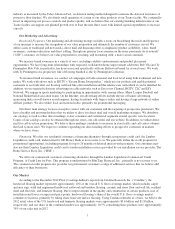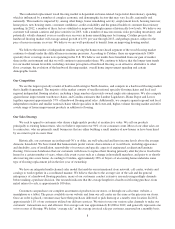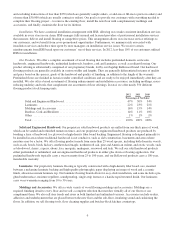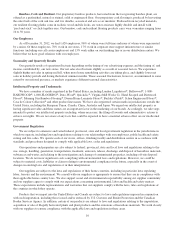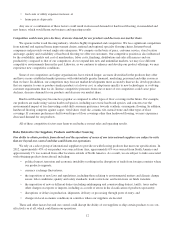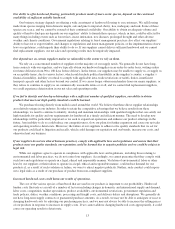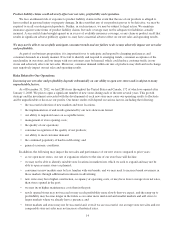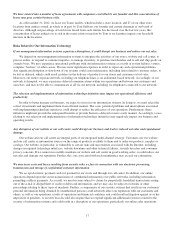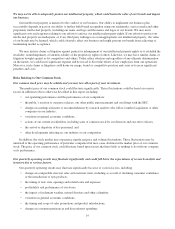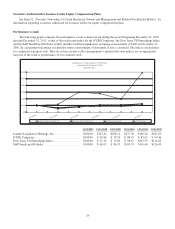Lumber Liquidators 2012 Annual Report Download - page 23
Download and view the complete annual report
Please find page 23 of the 2012 Lumber Liquidators annual report below. You can navigate through the pages in the report by either clicking on the pages listed below, or by using the keyword search tool below to find specific information within the annual report.We have entered into a number of lease agreements with companies controlled by our founder and this concentration of
leases may pose certain business risks.
As of December 31, 2012, we lease our Toano facility, which includes a store location, and 27 of our other store
locations from entities owned, in whole or in part, by Tom Sullivan, our founder and current chairman of our board of
directors. Although our percentage of total stores leased from such entities has decreased over the last few years, this
concentration of leases subjects us to risk in the event action or inaction by Tom or such entities impacts our leasehold
interests in the locations.
Risks Related to Our Information Technology
If our management information systems experience disruptions, it could disrupt our business and reduce our net sales.
We depend on our management information systems to integrate the activities of our stores, website and call center, to
process orders, to respond to customer inquiries, to manage inventory, to purchase merchandise and to sell and ship goods on
a timely basis. We may experience operational problems with our information systems as a result of system failures, viruses,
computer “hackers” or other causes. We may incur significant expenses in order to repair any such operational problems.
Any significant disruption or slowdown of our systems could cause information, including data related to customer orders, to
be lost or delayed, which could result in delays in the delivery of products to our stores and customers or lost sales.
Moreover, our entire corporate network, including our telephone lines, is on an Internet-based network. Accordingly, if our
network is disrupted, we may experience delayed communications within our operations and between our customers and
ourselves, and may not be able to communicate at all via our network, including via telephones connected to our network.
The selection and implementation of information technology initiatives may impact our operational efficiency and
productivity.
In order to better manage our business, we expect to invest in our information systems. In doing so, we must select the
correct investments and implement them in an efficient manner. The costs, potential problems and interruptions associated
with implementing technology initiatives could disrupt or reduce the efficiency of our operations. Furthermore, these
initiatives might not provide the anticipated benefits or provide them in a delayed or more costly manner. Accordingly, issues
relating to our selection and implementation of information technology initiatives may negatively impact our business and
operating results.
Any disruption of our website or our call center could disrupt our business and lead to reduced net sales and reputational
damage.
Our website and our call center are integral parts of our integrated multi-channel strategy. Customers use our website
and our call center as information sources on the range of products available to them and to order our products, samples or
catalogs. Our website, in particular, is vulnerable to certain risks and uncertainties associated with the Internet, including
changes in required technology interfaces, website downtime and other technical failures, security breaches and consumer
privacy concerns. If we cannot successfully maintain our website and call center in good working order, it could reduce our
net sales and damage our reputation. Further, the costs associated with such maintenance may exceed our estimations.
We may incur costs and losses resulting from security risks we face in connection with our electronic processing,
transmission and storage of confidential customer information.
We accept electronic payment cards for payment in our stores and through our call center. In addition, our online
operations depend upon the secure transmission of confidential information over public networks, including information
permitting cashless payments. As a result, we may become subject to claims for purportedly fraudulent transactions arising
out of the actual or alleged theft of credit or debit card information, and we may also be subject to lawsuits or other
proceedings relating to these types of incidents. Further, a compromise of our security systems that results in our customers’
personal information being obtained by unauthorized persons could adversely affect our reputation with our customers and
others, as well as our operations, results of operations and financial condition, and could result in litigation against us or the
imposition of penalties. A security breach could also require that we expend significant additional resources related to the
security of information systems and could result in a disruption of our operations, particularly our online sales operations.
17


